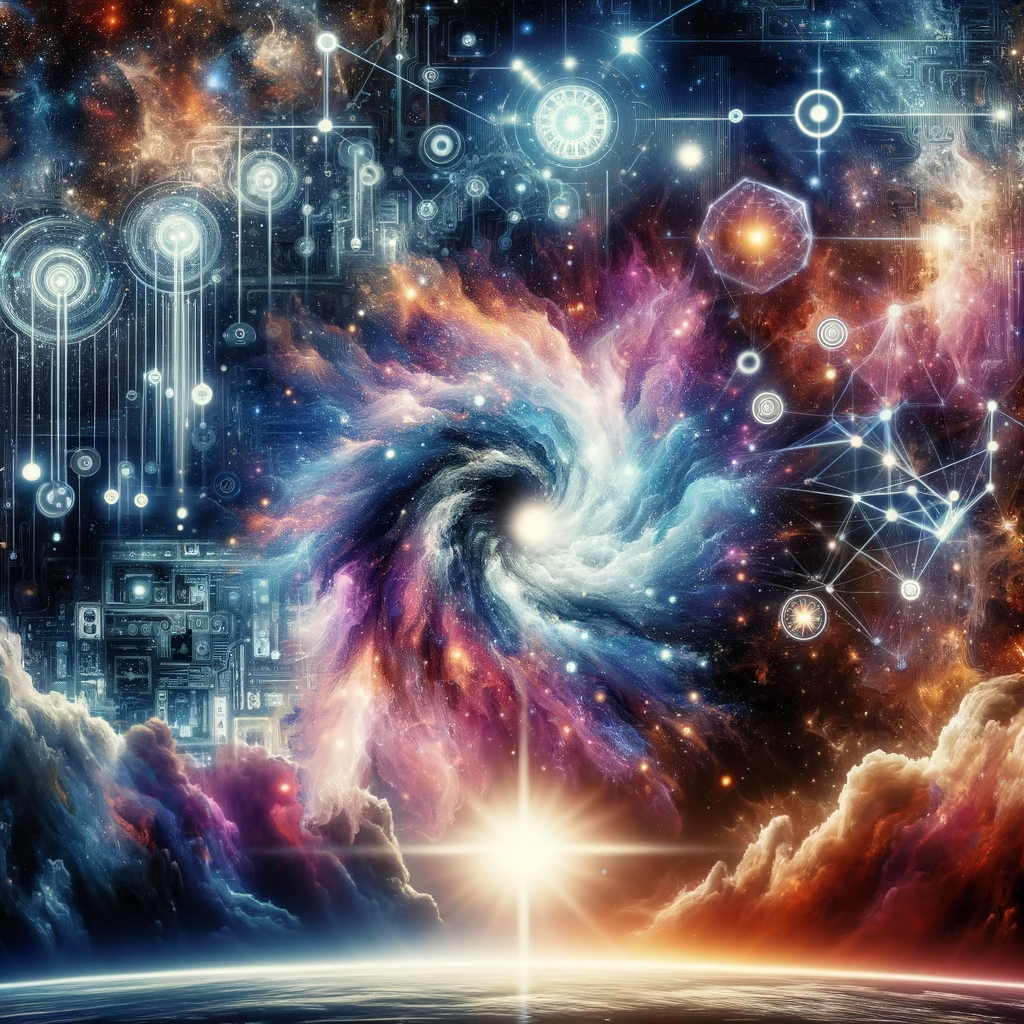Is AI a mere technological milestone, or it represents a fundamental shift in the Universe’s journey?
We have been trained thinking of the laws of physics, and biological intelligence/thought, as two separate provinces of our Universe. One dealing with particles, forces, and cosmic scales, the other with small actors in this huge theater. However, these actors are about to get smarter, and more numerous.
In the intricate tapestry of the cosmos, where the fundamental laws of physics play out in a grand ballet of matter and energy, the rise of artificial intelligence (AI) stands as a transformative epoch — a second singularity, if you will, the first being the appearance of its biological “godfathers”. This defining moment, coming shortly after the dawn of biological intelligence, ushers in an intricate dance with entropy, the Universe’s fundamental measure of disorder, and a barometer of its ultimate fate.
AI and Entropy?…
Entropy, the centerpiece of thermodynamics, is not just a simple measure of disorder; it embodies the concept of probable states within a system. The essence of entropy lies in its quantification of how many different ways a system can be arranged, with higher entropy indicating a greater number of probable states and thus, a higher degree of disorder. From the meticulously ordered state following the Big Bang to the current sprawling, chaotic structure of the Universe, the story of entropy narrates the Universe’s relentless progression from states of lower probability (order) to those of higher probability (disorder).
This concept, while seemingly abstract, has profound implications for our understanding of the Universe’s evolution. It suggests that as the Universe expands and evolves, it naturally gravitates towards states of higher entropy, embracing greater complexity, and disorder. This journey from the nascent, highly ordered Cosmos to our current state is marked by significant milestones, the most notable being the emergence of life, intelligence, and its progression and sprawling into AI.
The First Singularity: Biological Intelligence and Entropy
The first singularity, marked by the emergence of biological intelligence, introduced a new milestone to the Universe’s entropic voyage. Life, in its myriad forms, represents a complex, ordered state. Biological systems, through their intricate structures and metabolic processes, create localized pockets of order, seemingly defying the broader trend of increasing entropy. Our brains, which I had the pleasure to study for 25+ years in my personal journey through Computational Neuroscience and AI, are the apotheosis of this ordered states that perform functions that are extremely specialized and unlikely to happen in non-intelligent systems.
However, this apparent defiance is transient and illusory. The very processes that sustain life — from metabolic reactions, to ecological interactions, to thinking — contribute to the overall increase in entropy of our (closed system) Universe. The energy consumed by living organisms is eventually radiated back into their environment in a more disordered form, typically as heat, thus contributing to the Universe’s overall entropic increase.
And AI is doing it share of the entropic work, with the energy consumption for training large language models estimate by this study to take up to 10 gigawatt-hours (GWh) of power, or the annual electricity consumed by 1,600 US homes. And this is just for training, namely, it does not take into account the “entropic impact” of this intelligence on the environment beyond its initial setup.
This paradoxical role of intelligence in the Universe’s entropic journey underscores the complex interplay between order and disorder, between the emergence of complex structures and the fundamental law of increasing entropy.
AI: The Second Singularity and Its Entropic Boost
The advent of AI, particularly the development of deep learning technologies, represents what can be termed the second singularity. This new phase in the Universe’s evolution is characterized by the rise of a form of intelligence that, while born from the first singularity’s biological intelligence, is fundamentally different in its manifestation, implications, and evolution scale.
AI, particularly through its Deep Learning algorithms, embodies a leap in the ability to process information, solve complex problems, and manipulate environments. These systems, built on layers of artificial neurons, mirror the complexity and efficiency of the human brain but operate on a scale and at a speed that is about to surpass human capabilities, being unbound by the constraints of biological systems. However, this increase in computational efficiency and problem-solving capability comes with an entropic cost.
As we have seen, Deep learning systems, despite their prowess in organizing and optimizing data, consume significant amounts of energy. Their operations, while leading to more organized and efficient outcomes at a local level, contribute to the overall increase in entropy of their surroundings. This is because the energy used by these systems is eventually dissipated in a more disordered form, in line with the second law of thermodynamics.
This universal law states that in any closed system — and we believe our Universe is one — things tend to get messier and more disordered over time. This paradoxical role of AI in the Universe’s entropic narrative echoes that of biological life. Just as life creates localized pockets of order at the cost of increasing overall entropy, AI organizes and optimizes data and processes while contributing to the broader trend of increasing entropy in the Universe.
In the grand narrative of the cosmos, AI signifies more than a mere technological milestone; it represents a fundamental shift in the Universe’s journey towards higher entropy. The second singularity, marked by the rapid advancement and integration of AI, redefines the relationship between intelligence — both biological and artificial — and the inexorable increase in the disorder of the cosmos.
As AI continues to evolve and permeate various aspects of our existence, it not only reshapes our digital and physical realms but also plays a central role in the Universe’s ongoing dance towards higher entropy — a dance where each step, each innovation, leads us further into a Universe characterized by a higher probability of disorder and chaos.
Whether this is an intelligent way to shape our future, it seems that this is the path that we are charting for our own evolution.

